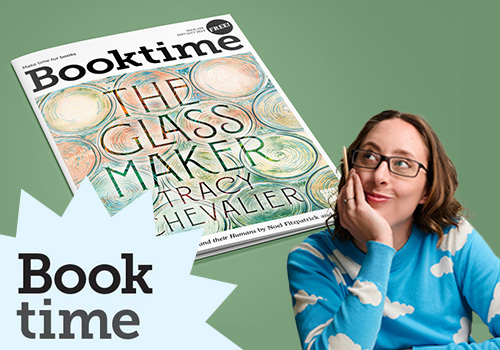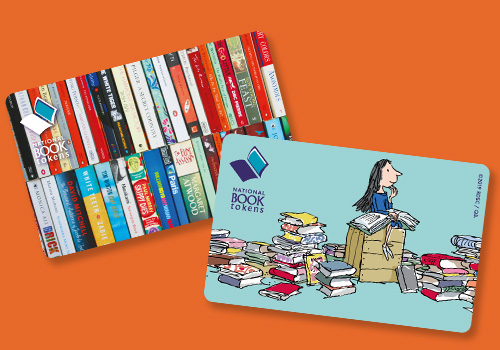Booktime: Interview with Louise Hegarty, author of Fair Play
A highly original debut novel by an Irish author, Fair Play combines a Golden Age-style locked room mystery with an exploration of grief. When Abigail plans a murder mystery night for her brother Benjamin and their friends on New Year's Eve, things soon become real. We interviewed the author Louise Hegarty to discover more.
This exclusive feature is from the March-April 2025 issue of Booktime magazine, the essential guide to the most anticipated books of the season. Find a free copy of Booktime in your local independent bookshop.

"I have always been a fan of murder mysteries and thrillers. I grew up with murder mystery-loving parents and would watch episodes of Poirot and Miss Marple on the television."
Fair Play is your debut novel. Have you always wanted to be a novelist?
I have always been a big reader and have wanted to be a writer since I was a child. I became more serious about writing in my late teens and started writing short stories which I started submitting to literary magazines in Ireland – and eventually getting them published!
The book blends a contemporary story with a classic mystery novel narrative. What inspired you to write it in this way?
I have always been a fan of murder mysteries and thrillers. I grew up with murder mystery-loving parents and would watch episodes of Poirot and Miss Marple on the television. I started thinking about a Golden Age-style detective novel that grapples with the aftermath of a sudden death on an emotional level. As I started to explore this idea a little more, I realised that the familiar structure of a whodunnit together with the fair play doctrine created the perfect environment to explore the emotions around death and grief.
The classic crime novel sections of the book are quite meta, with lots of reference to Agatha Christie's works. Did you have fun with the genre?
I really loved working on the murder mystery chapters. They were so much fun to write! It was great to play around with the genre and see how many references I could include.
The book includes several lists of rules for detective fiction from the 1920s – by T.S. Eliot, Father Knox and S.S. Van Dine. Do you agree with these rules, and did you write according to them?
The book is written in accordance with the fair play doctrine (with some liberties). The rules were a very important part of Golden Age detective fiction, taking advantage of the 'play fever' that existed in the interwar years, but I think that some of these lists (or individual rules within those lists) were written somewhat tongue in cheek and the rules were often broken by even their most famous proponents. I like playing with structure in my writing – but it’s even more fun when you find ways to get around the rules.
The book also explores grief – do you think that everyone grieves in a different way?
I think the way people deal with grief can be very individual – some people want to talk openly; others might prefer to deal with things privately – but I find that it is pretty universal for people to attempt to construct a narrative around what has happened. As human beings, we use stories to understand the world around us and in Fair Play, the main character Abigail uses the murder mystery as a familiar and comforting pathway to find her way through her grief.
Did you plan the book out in advance, or did it develop as you wrote it?
I'm very interested in structure and genre in my writing, so I generally plot things out quite thoroughly. I usually have a strong idea of what I want to write and how I want to write it. First, I did a lot of reading and re-reading and researching. Then, I wrote Part Two (already having a rough idea of what was to transpire in Part One). Initially, the detective chapters were looser, less connected to the Abigail chapters with no 'solutions' but through writing it I learnt what it needed to be. I followed Agatha Christie’s own method for writing books by assigning a method, motive, clues and red herrings to each 'suspect' and then deciding in which chapters these details would appear. I then went back and fleshed out Part One, developing characters and signposting what was to come. Finally, I wrote the ending. I was unsure initially how it was going to end but knew that I realistically had one of two options: fast forward into the future or visit the past. And then in August 2022 I got A Fortunate Man by John Berger from the library and the ending became obvious.
Which other authors inspire you in your work?
As a child, I loved the books of Diana Wynne Jones. I am also a big fan of Roberto Bolaño, BS Johnson and Margaret Millar.
What do independent bookshops mean to you?
Independent bookshops are such important 'third places'. I love the individuality, the personal recommendations, coming across books I may not have otherwise. They are invaluable as community hubs and when I travel, I always seek out independent bookshops to visit.

About Fair Play by Louise Hegarty
This is a murder mystery.
This is a story about love.
Or is it?
Abigail and her brother Benjamin have always been close. To celebrate his birthday, Abigail hires a grand old house and gathers their friends together for a murder mystery party. As the night goes on, they drink too much and play games. Relationships are forged, consolidated or frayed. Someone kisses someone they shouldn't, someone else’s heart is broken.
In the morning, everyone wakes up – except Benjamin.
Suddenly everything is not quite what it seems. An eminent detective arrives determined to find Benjamin's killer. The house now has a butler, a gardener and a housekeeper. This is a locked-room mystery, and everyone is a suspect.
As Abigail attempts to fathom her brother’s unexpected death in a world that has been turned upside down, she begins to wonder whether perhaps the true mystery might have been his life...
Louise Hegarty's Fair Play is the puzzle-box story that brilliantly lays bare the real truth of life – the terrifying mystery of grief.


